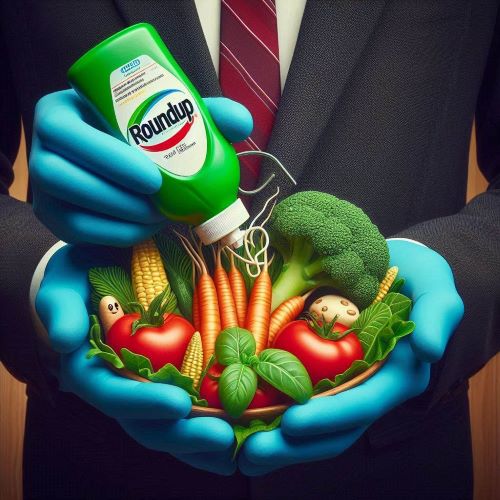Roundup is one of the most widely used herbicides globally, known for its effectiveness in controlling weeds. While it has been hailed for its agricultural benefits, concerns have been raised about its potential health risks and environmental impact. This article delves into everything you need to know about Roundup, including its usage, risks, and regulatory status, particularly in India.
What is Roundup?
Roundup is a brand name for a range of herbicides produced by Monsanto, a subsidiary of Bayer. The active ingredient in Roundup is glyphosate, a broad-spectrum systemic herbicide that targets a wide variety of weeds. Glyphosate works by inhibiting an enzyme essential for plant growth, effectively killing weeds while allowing crops to thrive. (Source)
Description and Usage
Description: Glyphosate, the key component of Roundup, was first introduced in the 1970s. It is a non-selective herbicide, meaning it can kill most plants it comes into contact with. Roundup is available in various formulations, including liquids and ready-to-use sprays, and is applied to crops, gardens, and public spaces.
Usage: Roundup is used extensively in agriculture to control weeds that compete with crops for resources. It is particularly popular for use with genetically modified crops that are resistant to glyphosate. This allows farmers to apply the herbicide without damaging the crops. Roundup is also used in horticulture, forestry, and home gardening to manage unwanted vegetation. (Source)
Also, read: Hadjod Health Benefits: Medicinal Uses, Nutrition & Warnings
Risks on Human Health and Environment
Health Risks:
The safety of glyphosate has been a subject of controversy. Some studies suggest potential health risks, including:
- Cancer: The International Agency for Research on Cancer (IARC) classified glyphosate as “probably carcinogenic to humans” in 2015. This has led to concerns about its association with non-Hodgkin lymphoma.
- Hormonal Disruption: Research indicates that glyphosate may act as an endocrine disruptor, potentially affecting reproductive health and development.
- Kidney and Liver Damage: Long-term exposure to glyphosate has been linked to potential kidney and liver toxicity.
- Respiratory Issues: Inhalation of glyphosate spray mist can cause respiratory irritation and discomfort. (Source)
Environmental Risks:
The widespread use of Roundup has significant environmental implications, including:
- Soil Health: Glyphosate can affect soil microorganisms, potentially disrupting soil health and fertility.
- Water Contamination: Runoff from treated fields can lead to glyphosate contamination in water bodies, affecting aquatic life.
- Biodiversity Loss: The use of Roundup can reduce biodiversity by killing non-target plant species, which in turn affects the insects and animals that depend on them.
- Herbicide Resistance: Overuse of glyphosate has led to the emergence of glyphosate-resistant weeds, making weed control more challenging and potentially leading to increased herbicide use. (Source)
Roundup Use in India
States and Crops: In India, Roundup is widely used in various states, with significant usage in Punjab, Haryana, Maharashtra, and Karnataka. It is commonly applied to crops like cotton, soybean, and vegetables such as tomatoes and potatoes. Among these, cotton and soybean are particularly notable for glyphosate application, especially in regions practicing extensive agriculture. (Source)
Regulatory Status in India: Roundup is not banned in India, but its use is regulated. The Central Insecticides Board and Registration Committee (CIBRC) oversees the approval and usage guidelines for glyphosate-based herbicides. Despite regulatory measures, there is ongoing debate about its safety and calls for stricter regulations or a complete ban. (Source)
Also, watch web stories: What is pranayama, one of the yogic practices, used for?
Global Status of Roundup
United States: In the US, Roundup is widely used, and glyphosate remains approved by the Environmental Protection Agency (EPA). However, several lawsuits have been filed against Monsanto, alleging that glyphosate exposure has caused cancer. Some states, such as California, have listed glyphosate as a chemical known to cause cancer. (Source)
European Union: The European Union has a more cautious approach, with some member states advocating for a ban. In 2017, the EU renewed glyphosate’s license for five years, but the debate continues, and some countries like France and Germany are moving towards phasing out its use.
Other Countries: Several countries have implemented bans or restrictions on glyphosate. For example:
- Sri Lanka: Banned the use of glyphosate in 2015 due to health concerns.
- Vietnam: Implemented a ban on glyphosate imports and use in 2019.
- Brazil: While glyphosate is widely used, legal and regulatory challenges continue to emerge.
FAQs
1. Is Roundup safe to use at home?
- While Roundup is effective for weed control, it is essential to use it with caution, following safety guidelines to minimize exposure. Consider using protective gear and applying it in well-ventilated areas.
2. Can Roundup cause cancer?
- The International Agency for Research on Cancer (IARC) classified glyphosate as “probably carcinogenic to humans.” However, regulatory agencies like the EPA maintain that it is safe when used according to label directions.
3. Are there safer alternatives to Roundup?
- Yes, there are several alternative herbicides and non-chemical weed control methods, such as manual weeding, mulching, and using organic herbicides like vinegar-based products.
4. How can I reduce exposure to glyphosate?
- To reduce exposure, wash fruits and vegetables thoroughly, avoid using glyphosate products in your garden, and choose organic produce when possible.
5. Why is glyphosate controversial?
- Glyphosate is controversial due to conflicting scientific studies on its safety, legal battles, and varying regulatory stances across the world.





